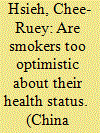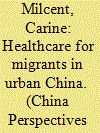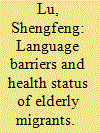| Srl | Item |
| 1 |
ID:
145579


|
|
|
|
|
| Summary/Abstract |
The general goal of the present study is to analyze whether children with siblings lag behind their only-child counterparts in terms of health and nutrition, cognition and educational performance, and non-cognitive outcomes. We draw on a dataset containing 25 871 observations constructed from three school-level surveys spanning four provinces in China. The analysis compares children with siblings and only children aged 9 to 14 years old in terms of eight different health, cognitive and non-cognitive indicators. We find that with the exception of the anemia rate, health outcomes of children with siblings are statistically indistinguishable from those of only children. In terms of cognition, children with siblings performed better than only children. Moreover, outcomes of children with siblings are statistically indistinguishable from those of only children in terms of the non-cognitive outcomes provided by measures of anxiety. According to our results, the same general findings are true regardless of whether the difference between children with and without siblings is disaggregated by gender.
|
|
|
|
|
|
|
|
|
|
|
|
|
|
|
|
| 2 |
ID:
159039


|
|
|
|
|
| Summary/Abstract |
As the world has moved toward the era of non-communicable diseases, whether the individuals are in a capable position to accurately evaluate their own health status has an important implication on disease prevention in particularly and population health outcome in general. In this paper, we address four important questions surrounding the accuracy of health perception: (1) to what extent that individuals can make an accurate evaluation on their own health status; (2) what are the major factors influencing health misperception if any; (3) what are the causal directions between health behavior and health perception; and (4) whether individuals can learn and update their self-evaluation on health status over time and whether such learning is productive in that it mitigates the health misperception. Specifically, we use a longitudinal data set obtained from Taiwan that covers six waves of survey over about twenty-year period to compare the ex ante subjective perception on health and the ex post mortality hazards. Our results suggest that over one third of the survey respondents are not performing well in the evaluation of their own health status. We also find that smokers are more likely to have an optimistic bias on their own health assessment as compared to nonsmokers. After controlling for the simultaneous causality problem, we find a causal effect of individuals' misperceptions on continuing smoking, but not vice versa. In addition, our results show that individuals update their subjective perception on health over time through the learning from personal health shocks and the provision of public information on smoking hazards. Although the learning process tends to be overshooting among smokers, it is beneficial to mitigate the optimistic bias. We also find the evidence that personal health shock has a stronger impact on updating behavior than public information, indicating that personal experience is a more effective channel through which to correct the bias in health perception, compared to the provision of public information, such as anti-smoking campaign.
|
|
|
|
|
|
|
|
|
|
|
|
|
|
|
|
| 3 |
ID:
102245


|
|
|
|
|
| Publication |
2010.
|
| Summary/Abstract |
How can healthcare access for Chinese migrants be improved? Migrant workers face two types of healthcare-access exclusion in the workplace: one is financial (because of their income) and the other is social (because of the lack of social networks in the city). We use 2006 data from a survey of rural migrant workers conducted in five of the most economically-advanced cities. The empirical findings support the hypothesis of a return to the hometown for migrant workers with poor health. Apart from residency permits and income, the social integration of migrant workers is also found to be a decisive factor in healthcare access.
|
|
|
|
|
|
|
|
|
|
|
|
|
|
|
|
| 4 |
ID:
170089


|
|
|
|
|
| Summary/Abstract |
This paper empirically examines the effect of language barrier on elderly migrants' health status by exploiting individual-level data from the “China National Health Survey of Migrants 2015” database. We build an indicator of language barrier with geographical distribution information of Chinese dialect regions, and further separate the language effect from the migration effect by checking whether migrants move into a region with a different dialect. Results indicate a significant and negative impact of the language barrier on the health status of elderly migrants. Specifically, a language barrier results in poorer health conditions for younger elders. The mechanism test shows that a language barrier reduces migrants' abilities to build a social network, which is harmful to their health. Elderly migrants who are less-educated, live in host residence for a shorter time and move for business incentives suffer more from a language barrier. This study proves the power of a verbal language barrier to migrants' health.
|
|
|
|
|
|
|
|
|
|
|
|
|
|
|
|
| 5 |
ID:
191107


|
|
|
|
|
| Summary/Abstract |
There is no consistent conclusion on the impact of improving the physical accessibility of medical facilities/resources on the utilisation of medical facilities and health outcomes, which may be due to neglecting the role of spatial cognition of physical facilities, which will be directly related to health behaviour and outcomes. This article uses China Migrants Dynamic Survey to examine the relationship between perceived accessibility of medical facilities and health and health behaviour. The results show that perceived accessibility is positively associated with health and related behaviour. The higher the perceived accessibility to the medical facilities, the better the subjective and objective health status of migrant residents. Similarly, the more positive the preventive and healthcare-seeking behaviour is. This study suggests that public policymakers need to intervene in residents' spatial cognition of medical resources around their neighbourhoods to enhance the collective benefits of medical facilities.
|
|
|
|
|
|
|
|
|
|
|
|
|
|
|
|